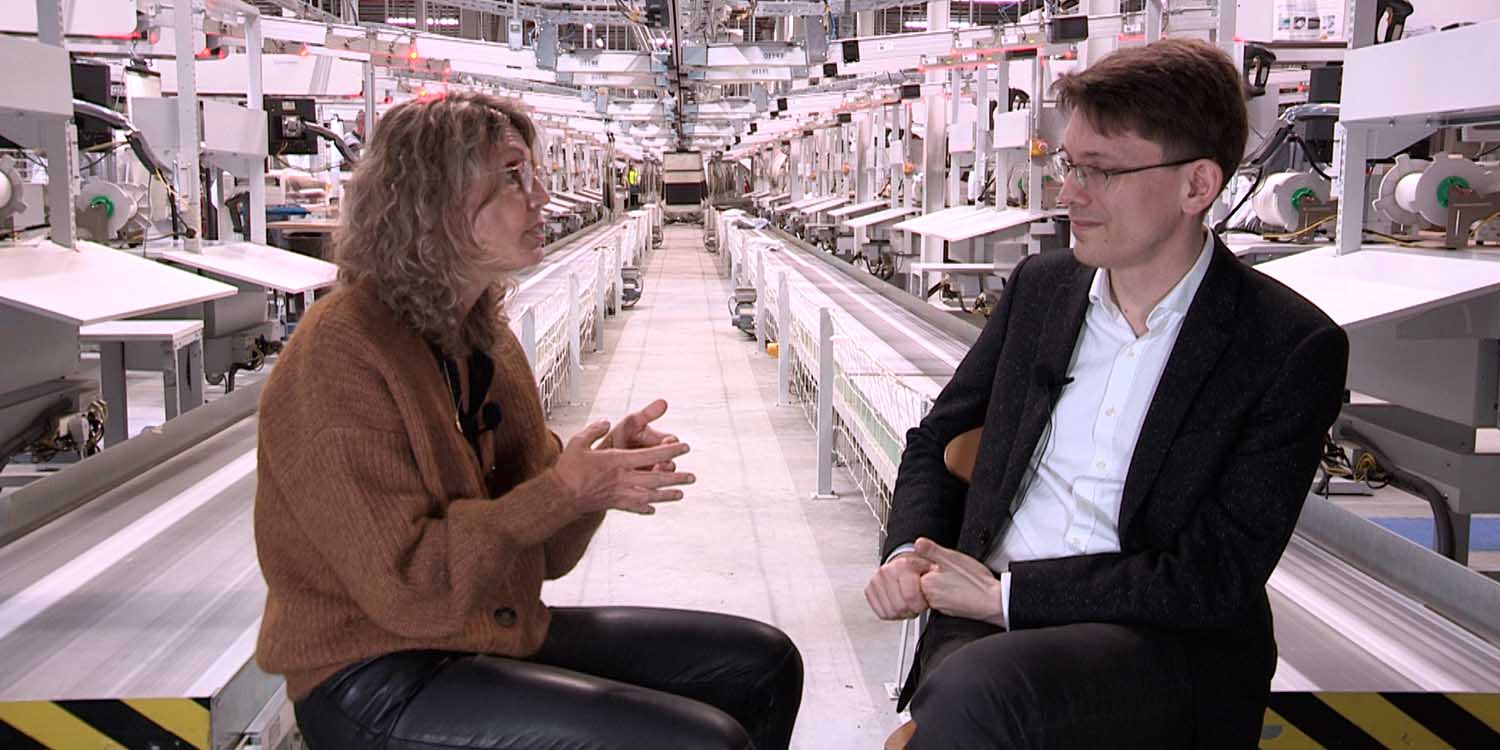00:00:03 Introduction to Sandrine Guichard, La Redoute Home Segment Director.
00:01:01 La Redoute’s international operations and sales channels.
00:02:00 Challenges faced by supply chains during growth.
00:02:50 Difficulty of sourcing materials worldwide.
00:03:53 Main challenges in the home segment.
00:04:58 Managing suppliers and collaborations.
00:05:54 Transition from mail order to promotional business.
00:06:54 Participating in sales events like Black Friday.
00:08:08 Discussing technology-driven changes in top management.
00:09:08 Discussing competitiveness in digital world.
00:10:01 Value of human intelligence in retail.
00:11:07 Emphasis on creativity and data management.
00:12:19 Closing remarks on industrial logistics site.
Summary
Joannes Vermorel, the founder of Lokad, hosts Sandrine Guichard, Home Decoration, Retail and B2B Director at La Redoute, on his show. They discuss Guichard’s responsibilities, including overseeing home decoration retail and B2B, managing two private labels, and coping with challenges such as supply chain stresses and container shortages. She also talks about maintaining approximately 40,000 SKUs with 300 suppliers globally. When asked about pricing strategies, Guichard highlights the balance between price, quality, and style. Discussing the digital marketplace, Guichard predicts future growth and emphasizes data analysis, human creativity, and customer interaction. Lastly, she highlights desirable hiring qualities: creativity, data and financial management skills, leadership, and passion.
Extended Summary
The discussion begins with host Joannes Vermorel, the founder of Lokad, introducing their location at La Redoute’s logistics platform. He then gives a warm welcome to Sandrine Guichard, the Retail and B2B Director at La Redoute, and invites her to share about her responsibilities.
Guichard describes her role as overseeing home decorations, retail and B2B, which involves designing collections and selling them to customers. She manages two private labels, La Redoute Interiors and AM.PM, and collaborates with vendors in a marketplace setting. While the internet serves as their primary sales channel, they also operate physical stores, predominantly in France, with few pop-up shops internationally. Additionally, they have a B2B activity where they sell goods to interior designers, hotels, restaurants, and businesses that recommend their products to professionals.
The host then brings up the consistent growth of the e-commerce home segment in Europe over the last two years, despite unusual and exceptional circumstances. He notes that La Redoute has also seen significant growth amidst this surge in demand. However, this comes with its own set of challenges. Vermorel notes that the supply chains were under high stress during this period and asks Guichard how La Redoute managed this situation.
Guichard admits that it was a hectic time, citing closed factories, limited manpower, and shortages of raw materials as a few of the issues faced. They also struggled with sea freight transportation due to a shortage of containers. Despite these challenges, she mentions that thanks to their established partnerships with suppliers, they were able to maintain delivery, albeit not perfectly. She especially notes the boom in demand for sofas and home offices, adding to the challenges.
Vermorel then acknowledges the complexity of the home segment even under normal circumstances. He notes the diversity of products sold, from small accessories to large sofas and mattresses, and asks Guichard to elaborate on the challenges they face and the scale of the problem.
In response, Guichard acknowledges the wide range of products they offer, including home textiles, a key category for La Redoute, and small decoration items. Guichard notes that La Redoute maintains approximately 40,000 Stock Keeping Units (SKUs) with roughly 300 suppliers worldwide. Their inventory covers an expansive range, including large furniture, outdoor furnishings, sofas, and mattresses. They have a particular emphasis on mattresses, establishing a prominent online presence in France and across Europe.
Vermorel, inquiring about La Redoute’s pricing strategy, mentions that Lokad has been collaborating with La Redoute for some time, focusing on pricing discounts. He raises the concept that customers generally prefer lower prices for equivalent quality products. He seeks Guichard’s perspective on what influences their pricing strategy and why they offer discounts.
Guichard explains that La Redoute’s background in the mail-order business naturally positions them in a promotional environment. However, while price is a significant consideration, they also emphasize quality and style. La Redoute aims to stand out in the market with their uniquely designed products. They run promotions throughout the year based on seasonality, offering discounts to customers. These promotions can be tied to events like end-of-year sales, Black Friday, and more. Additionally, they take into account the customers’ buying power and market circumstances while aiming for a reasonable profit margin. Thus, finding the right balance is essential to La Redoute.
When discussing Lokad’s role in this balance, Vermorel notes that Lokad’s approach is heavily quantitative. They work on crafting numerical strategies in close collaboration with their client teams. The goal is to be approximately correct rather than precisely incorrect. Although they rely on clients for expertise in their respective sectors, their focus remains on addressing the problem through quantitative measures.
In response to how Lokad’s technology and approach influence La Redoute’s management and future plans, Guichard indicates that their business is increasingly turning towards digital. Despite the current small size of the online furniture market in France, which stands at 13%, she foresees continual growth, particularly when compared to larger markets like the UK and Spain. This growth reflects the rising penetration of digital channels in the retail sector, emphasizing an increasingly omnichannel world where customers desire a blend of physical and digital interactions. As Guichard notes, some customers still wish to touch or try products, necessitating a physical presence alongside their growing online operations.
The digital marketplace is highly competitive, necessitating a continuous analysis of data to remain viable. Guichard suggests that this reliance on data will only grow in the future, as the complexity of the business demands it. However, despite the increasing prominence of data, she posits that human intelligence will remain crucial, particularly in understanding customer needs and designing products that meet them. Thus, La Redoute envisions data tools and human creativity working complementarily. Data tools, by taking over more mundane tasks, allow their teams to focus on complex problems, further enhancing their creative capacities.
Joannes Vermorel agrees with Guichard’s emphasis on human intelligence. Despite the extensive mechanization in their work, Vermorel sees Lokad’s operation as driven by human ingenuity. The machines merely handle tedious calculations rapidly, while the insights and understanding of the problems they solve come from astute individuals.
The interview then shifts to Vermorel inquiring about the qualities La Redoute seeks when hiring, especially for those interested in home segments and digital commerce. Guichard identifies several desirable qualities, including creativity, data and figure management skills, and financial management skills. She believes these qualities are essential to face the high challenges of their field. Along with these skills, she underlines the importance of communication, understanding the market, the customers, and the competition.
In addition, Guichard mentions the necessity of leadership skills, as they need individuals who can lead projects effectively. Above all, Guichard emphasizes the need for passion - not just a love for decoration and design, but a commitment to being involved and dedicated to their business. These are the types of individuals La Redoute seeks to work with on a daily basis.
The conversation concludes with Vermorel thanking Guichard for her insights and the opportunity to visit their industrial logistics site. The interview paints a picture of the changing landscape of retail, emphasizing the blend of creativity, data, and human ingenuity that drives companies like La Redoute in the increasingly digital age.
Full Transcript
Joannes Vermorel: We are not in the Lokad office, we are in Roubaix, at the logistic platform of La Redoute. La Redoute is a client of Lokad. Today, it’s a pleasure to be a guest of Sandrine Guichard who is actually the Director of the Home Segment at La Redoute. So, Sandrine, could you tell us a little bit about your responsibilities at La Redoute?
Sandrine Guichard: Hello Joannes, nice to welcome you here in Kit Hunt, our warehouse for small items to be delivered. So, I’m in charge of home decorations, retail and B2B, which means designing the collections and selling them to customers. In summary, we are running two private labels, La Redoute Interiors and AM PM, along with a marketplace including vendors which are complementary in terms of products, pricing levels and so on. And we’re doing that in France but also internationally through various sales channels. Web is obviously our main channel, we are an online player of course, but we also operate stores mainly across France but also with some pop stores internationally. We also have a B2B activity, selling goods to interior designers, hotels, restaurants, and headquarters that are recommending our goods for professionals.
Joannes Vermorel: The home segment, especially the e-commerce home segment, has been growing steadily in Europe for the last two years. The conditions were very exceptional, very unusual, so La Redoute has been growing also significantly as well. But at the same time, while demand was surging, supply chains overall were under a state of super high chaos compared to what we had before. So, what did La Redoute do to handle the chaos on one hand and the surge of demand on the other hand?
Sandrine Guichard: It was a never seen before period, not only for La Redoute but for worldwide supply chain. It was very chaotic. Some factories were closed, some factories were very much limited in terms of manpower and raw materials, and so on. We also faced issues on the sea freight transportation with a shortage on containers which was incredibly difficult to handle, considering we’re buying all across the world, not only in Asia but also in Middle East, Eastern Europe, France, Italy, and so on. It was a very difficult situation for the teams to handle. Thanks to the partnerships we have with some suppliers, we managed to get our deliveries, not everything, not perfectly, but we managed. We especially saw a boom in demand for sofas and home offices over the last two years. It was a very challenging and demanding time for our teams.
Joannes Vermorel: Even in normal conditions, the home segment is very complex. You’re selling a range of items from small accessories to super large sofas, mattresses and more. There’s quite an incredible diversity. What are the main challenges you see in keeping up with this segment? Maybe if you could give us a few numbers too, so that people can assess the scale of the problem?
Sandrine Guichard: As you say, it’s quite a diverse offer we are running from home textiles, which is a key player at La Redoute since a very long time. We are a leader in France for these kind of products. Our inventory includes many SKUs, colors, sizes. We sell small decoration items, tableware, and so on. It’s again a large number of references with a frequent renewal of products. We also offer bigger furniture pieces for living rooms, bedrooms, gardens as well as outdoor furniture and mattresses. We are a major player online for mattresses in France and across Europe. All of that is approximately 40,000 SKUs at the lowest level, and it’s around 300 suppliers to be managed all across the world.
Joannes Vermorel: Lokad has been working with your teams for a few years now. We are tackling, in French, “La Démarque”. That’s literally a pricing discount. The audience might be familiar with the theories that I present on the channel. I usually present the more theoretical mathematical approach on how to tackle these phenomena. But I would be interested in your perspective on what this discount exactly is and why La Redoute is doing it. Given the quality is the same, the lower the price is always better for the client, but there is a question: What is the strategy that drives a good pricing from the perspective of La Redoute?
Sandrine Guichard: Coming from the mail order business, it has always been a promotional business, and we’re not the only ones running this kind of promotions. The idea is to offer the best deal, the best price to customers at every single point of time in the season, in the year. We emphasize on quality, style, and price. We’re not only a price dealer but the quality and style is extremely important to us and it’s also a way to stand out in the market. The design of our product is quite unique. So it’s not just about pricing. However, quite often, we are offering discounts to customers depending on the seasonality of the year. For instance, it’s not the same for the white catalogue at the end of the year for home textiles as the “La Démarque” for some kind of product. Obviously, we have the sales, we have this very strong operation named Black Friday coming from the US, and ramping up year by year in France and Europe. So, there is a calendar of promotions that we are managing and we are trying to find the best equilibrium between what the customer may be able to purchase, given the current circumstances, and our expectation of profit from the product. Finding the right balance across this vast number of references is a challenge.
Joannes Vermorel: Coming to the balance, at Lokad, we have our own approach which is highly quantitative. Essentially, we craft numerical recipes and discuss a lot with the teams so that we are at least approximately correct as opposed to being exactly wrong. We want to have a strong adherence to the problem that we are looking at and obviously the expertise can only come from the client. We are not expert in the home segment and the various positions are, but nonetheless, our approach is extremely quantitative in nature. As being part of the top management, how are you conducting the change that a technology and approach like Lokad represent for La Redoute and where do you see that going for the next decade?
Sandrine Guichard: Next decade, I don’t know. It’s so difficult to forecast at this stage, but what we can see is that our business is becoming more and more digital. On the furniture side, for instance, it’s still a small size of the market. For example, in France, furniture is only 13% online. Of course, it’s larger in the UK or other countries like Spain, but the penetration is growing. So, it’s becoming more and more digital, but also digital with physical stores, as that’s the customers’ expectations. Some of them want to touch or try the products, so it’s really an omnichannel world. The digital market is also highly competitive. It’s a business where you analyze data all day long. This will certainly increase. A human brain, as good as they are, can’t tackle the entire complexity of it. What we foresee is data playing an increasing role in the daily work of our teams. We expect them to be more creative, to better understand the customer because data won’t do everything. While data can help design products, we believe human intelligence will remain very important in terms of understanding the customer, designing the products, and being commercial. It’s hard to state, but that’s very important to us. Data and tools that we design together will be very complementary. It also helps our teams to save time and improve productivity in order to focus on more complex problems.
Joannes Vermorel: I can’t agree more with the human intelligence. My perspective is that what Lokad does is 100% human intelligence with tons of mechanization, but nonetheless, it’s 100% human ingenuity. Even if the machine is just doing the mundane calculation at a very high speed, in the end, the insight comes from a smart person who understands the problem to be solved. And maybe as a closing question for you would be, for young talents who are interested in this area of the home segment in digital commerce, what are the qualities that you look for when you’re hiring people who apply to La Redoute? And what sort of qualities do you cultivate on the people who are directly under your responsibility?
Sandrine Guichard: There are many qualities we look for to face these high challenges. Creativity is key to our job, to our business. But along with that, management of data, figures, and financials are important too. It’s not so easy to find in the same person an understanding of creativity and data, figures, and management. We also expect people to be able to communicate, understand the market, the customers, the competition which is becoming more and more aggressive, and to be able to explain what they are doing, lead projects. And of course, having people passionate about the business is important. It’s not just about loving decoration. Yes, of course, it’s important to love what you do, to be interested in design and so on, but it’s also to be very involved in the topics. That’s the kind of people we are working with on a daily basis.
Joannes Vermorel: Thank you very much. So again, we are on this fantastic industrial logistics site, and thank you very much.


